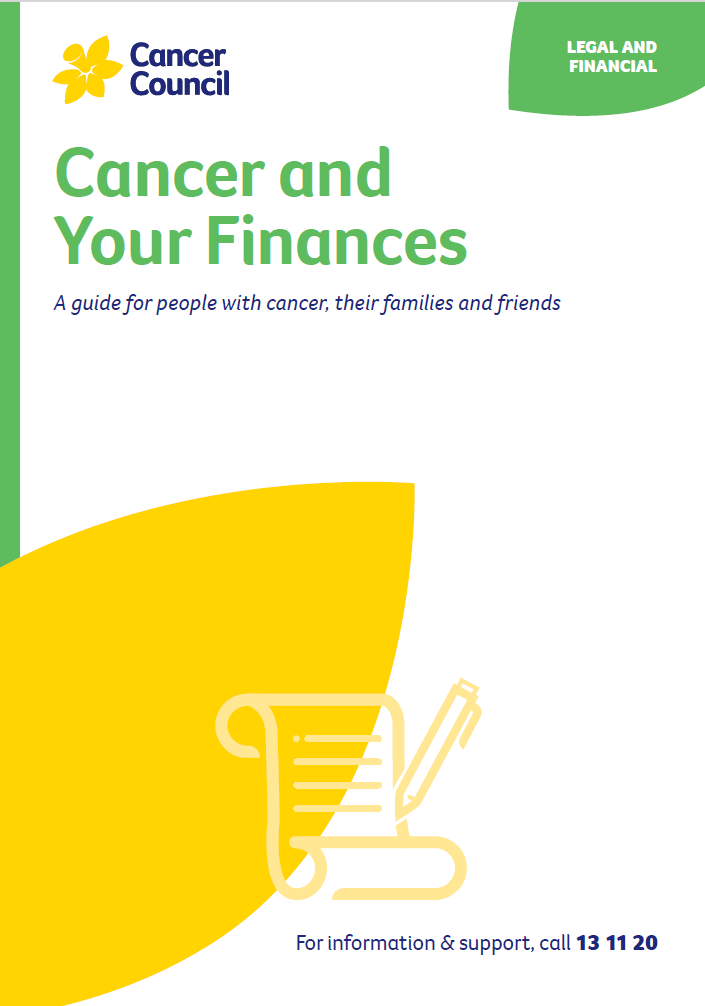- Home
- About Cancer
- Coping with a diagnosis
- Cancer and your finances
- Reducing debts and expenses
- Travel costs
Travel costs
Having cancer treatment can mean a lot of travel to and from your medical appointments. There are several ways to save on travel costs.
Learn more about:
- Making a patient transport claim
- Using your Pensioner Concession Card
- Checking if you’re eligible for the Mobility Allowance
- Asking about parking concessions
- Video: Debts and everyday expenses
Make a patient transport claim
People who need to travel away from home for treatment may have extra expenses. There is financial help available for transport and accommodation costs.
Patient Assisted Travel Schemes (PATS)
Every state and territory has Patient Assisted Travel Schemes (PATS) for people who need to travel long distances for specialist medical treatment that is not available in their local area. Many schemes also help with the cost of accommodation, if it is needed.
The eligibility rules are different for each state and territory. In general, you must be a permanent resident of the relevant state or territory and also need to travel a significant distance to the closest available specialist treatment.
Subsidy schemes
Most patient transport assistance schemes are subsidy schemes – they pay a part of your travel and accommodation costs, but you need to pay the rest. Usually, you will need to cover the upfront costs in full and get reimbursed later. If you have a concession or health care card, you may be able to apply for assistance before you spend the money.
Application process
If you meet the eligibility criteria, you and your doctor will need to complete a form. You may also need to provide original tax receipts and medical certificates to support your application.
To find out about the transport support offered in your state or territory, visit healthdirect.gov.au and search for PATS. Cancer Council can help you find transport to treatment. Call 13 11 20.
Use your Pensioner Concession Card
If you receive certain payments from Centrelink, you will automatically receive a Pensioner Concession Card. This will mean you can get lower fares or free travel on public transport and discounts on car registration.
Carry your card with you and ask for the concession fare when you use public transport. When renewing your car registration, claim the concession rate if you are eligible.
To see what concessions are available, visit Services Australia and search for Pensioner Concession Card benefits.
Check if you’re eligible for the Mobility Allowance
If the type of cancer or treatment you have makes it hard for you to use public transport and you receive certain Centrelink payments, you may be eligible for the Mobility Allowance.
This allowance only applies if you are travelling to work (paid or voluntary), study or training, or travelling to look for work. It is a regular extra amount that is paid with your main Centrelink payment each fortnight.
Check if you are eligible for Mobility Allowance and submit an online claim. You can also call Centrelink on 132 717. You will need to provide a medical report from your doctor.
Ask about parking concessions
Reduced parking fees are often available to help cover the cost of parking for people who are having ongoing cancer treatment, hold pension cards (e.g. Pensioner Concession Card, Health Care Card) or are in financial hardship.
If you will be driving to treatment – or someone will be driving you – ask your treatment centre or the hospital social worker about whether discounted parking rates are available, and how to get them.
Video: Debts and everyday expenses
Podcast: Coping with a Cancer Diagnosis
Listen to more of our podcast for people affected by cancer
More resources
HWL Ebsworth Lawyers, Sydney, NSW; Leigh Aitken, Consumer; Mary Bairstow, Senior Social Worker, Cancer Centre, Fiona Stanley Hospital, WA; Lynette Brailey, Team Leader Financial Counselling, Cancer Council NSW; Corinne Jones and Siew Tan, Financial Counsellors, Cancer Council VIC; Penny Jacomos, Social Worker, Asbestos Diseases Society of South Australia, SA; Dr Deme Karikios, Head of Department – Medical Oncology, Nepean Cancer and Wellness Centre, Nepean Hospital, NSW; Valerie Parsons, 13 11 20 Consultant, Cancer Council SA; Viridian Financial Group, Melbourne, VIC.
View the Cancer Council NSW editorial policy.
View all publications or call 13 11 20 for free printed copies.

